A day in the life
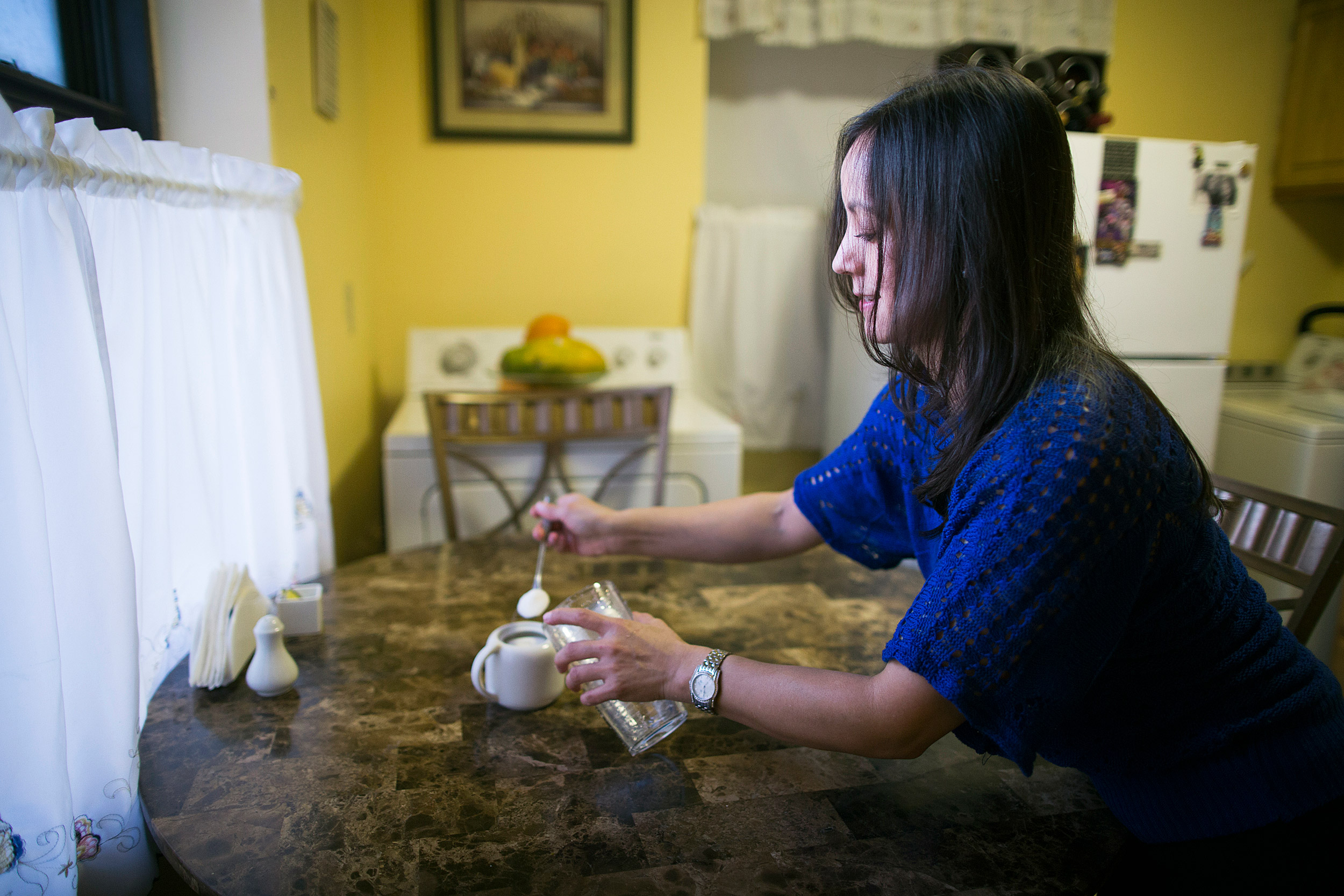
Ana Osorio starts her day with a coffee for the road.
Photos by Stephanie Mitchell/Harvard Staff Photographer
Following a Harvard custodian from dawn till night
The clouds are dark outside the East Boston apartment complex where Ana Osorio has lived for more than a decade with her daughter, Stefani, when the cellphone alarm goes off at 6:10 a.m.
After a quick shower, Osorio gets dressed, puts on some makeup, and runs to the kitchen to prepare oatmeal for the two of them. When she has time, she makes eggs with beans, a nod to her Honduran upbringing and a favorite of her daughter. But on this day, they’re sleepy. A fire alarm had rung at 4 a.m. and disrupted their sleep.
“Are you ready, Stefani?” calls Osorio in English from the kitchen as she pours the oatmeal mix into portable travel mugs.
“Yeah,” says Stefani, a stylish 18-year-old with a ready smile, as she comes out of her room, a rose gold cellphone in her hand.
Osorio has to drop Stefani at high school in Charlestown by 7:30 before heading to the Harvard Business School (HBS), where she has worked as a custodian for the past 3½ years. When they climb into their white Subaru, Stefani smiles and starts taking selfies with her phone. Sometimes she turns off the radio station her mother favors, Kiss 108 FM, to listen to the playlist on her phone, which includes Ariana Grande, Camila Cabello, and Halsey.
“Don’t forget to take the oatmeal with you,” Osorio reminds her.
“What’s for dinner, mom?” Stefani asks.
“Tonight, I’ll be home late, mami,” says Osorio, using a Spanish term of endearment. “Have a cheese sandwich or a quesadilla.”
On this chilly morning, the car cruises along Route 1A and leaves Revere and Chelsea behind. The Boston skyline emerges as the clouds lift.
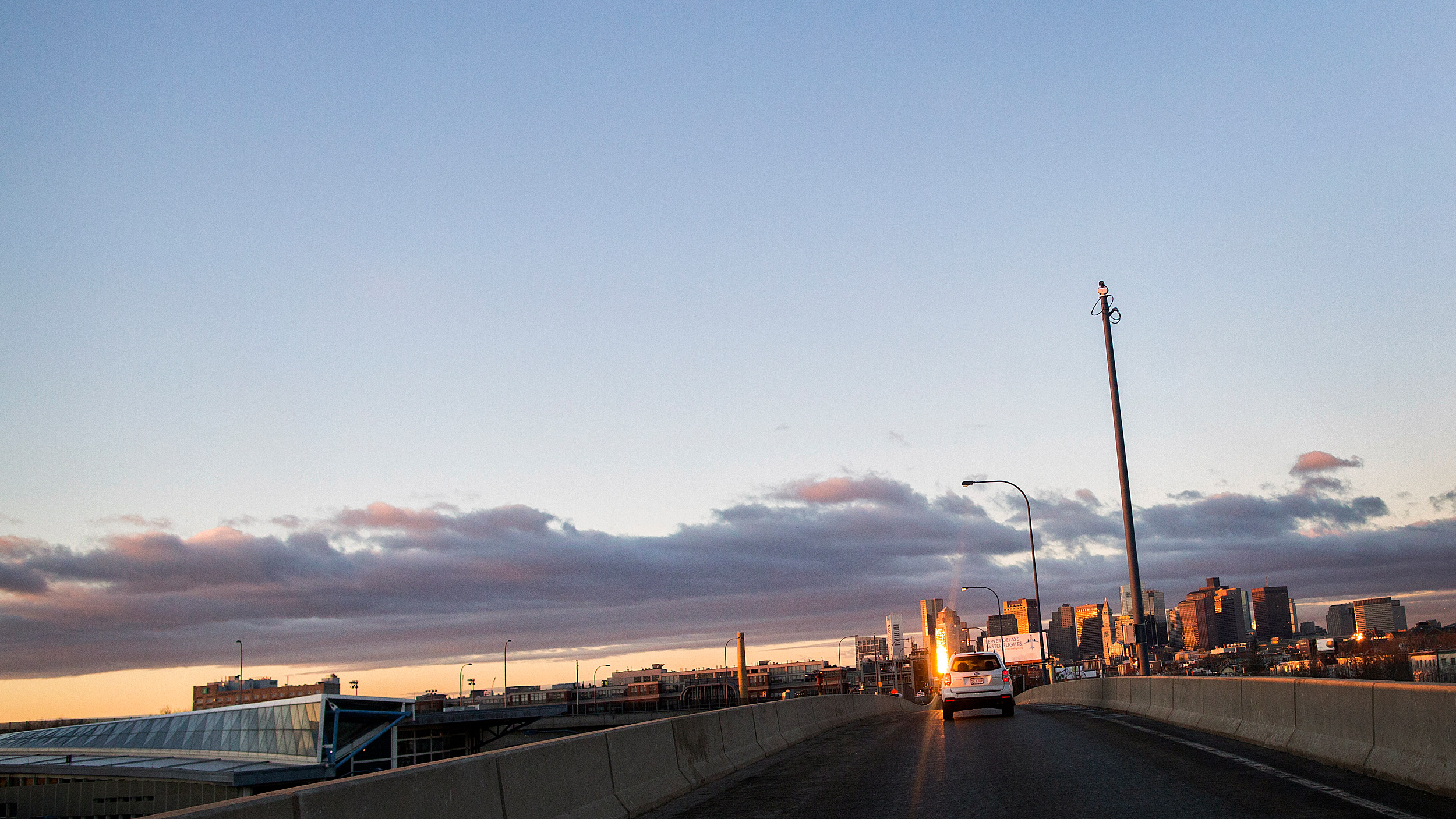
It’s 7:20 when Osorio arrives at Charlestown High School, where Stefani, a special-needs student with schizencephaly, a rare congenital condition that causes developmental delays, is in 12th grade. To help Stefani develop her language skills when growing up, Osorio spoke mostly English, but she peppers her speech with Spanish words. After Stefani climbs out of the car and walks to her school, Osorio realizes her daughter had forgotten her oatmeal.
“No quiere comer,” says Osorio, worry in her voice. “She doesn’t want to eat.”
A savvy Boston driver, Osorio reaches the Business School’s garage on Memorial Drive in less than 30 minutes. She’s early for her 9 a.m.-to-4:30 p.m. shift, but is ready to start. She won’t be home until 8 p.m. “Today is a long day,” she says. After her day at the Business School, she will head to Somerville, where she cleans a four-story building, a side job so she can save money for rainy days.
In spring, her days were even longer when she interned as an administrative assistant with The Bridge program, which helps University workers advance their careers.
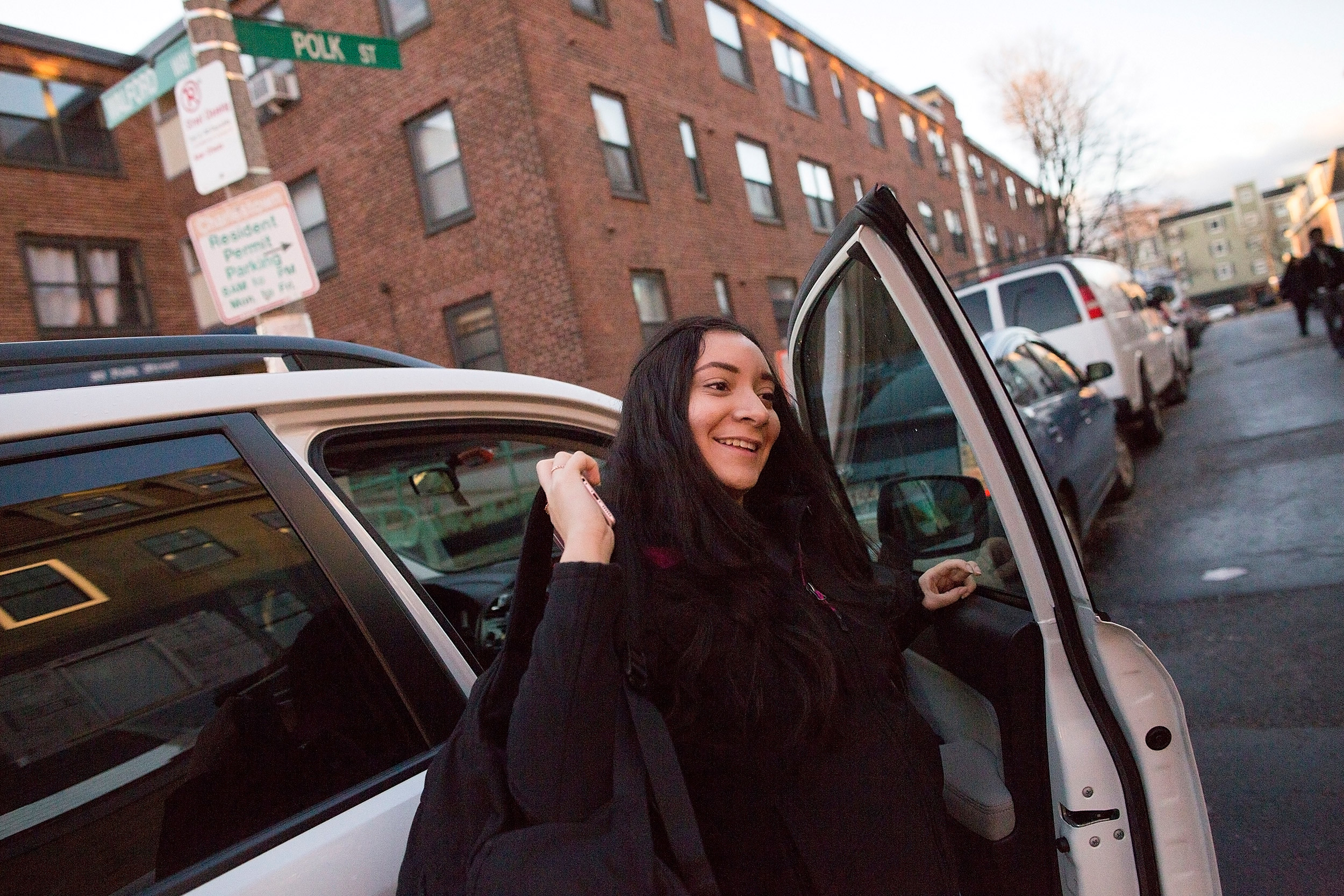
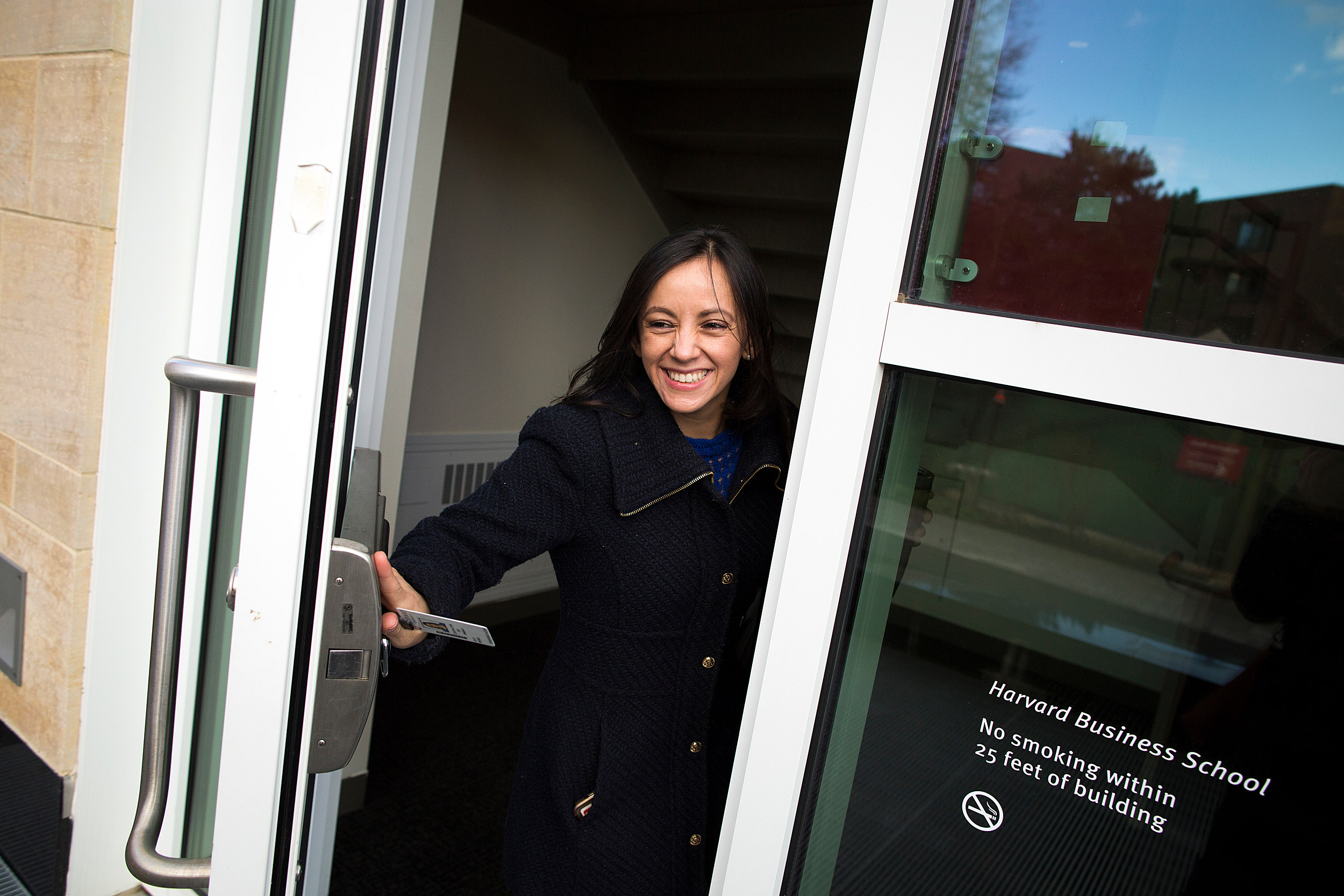
Osorio drops daughter Stefani off at school in Charlestown on her way to work at Harvard Business School.
With her ID card, Osorio checks in at the back entrance of Tata Hall, the sleek, glass-and-stone building on the banks of the Charles River on the sprawling Allston campus. She changes her blue lace top, black pants, and boots with high heels for blue scrubs, plastic gloves, and black sneakers.
She then walks to the Chao Center, a modern building with an imposing brick veneer and glass wall, where she cleans the bathrooms on the first floor and makes sure the chairs and tables in the dining hall are clean and orderly. Every hour or so, she checks the bathrooms to make sure they’re in good shape.
Osorio spends most of her workday at McArthur Hall, one of three buildings that serve as residence and education centers for the HBS Executive Education Program, which attracts more than 10,000 business leaders each year.
A Georgian-style building six stories high, McArthur Hall features 160 bedrooms and 20 communal areas called “living groups,” main rooms with kitchen areas, which function as classrooms and gathering places. Osorio’s job is to clean the living groups, located in the building’s north and south areas.
As she enters the laundry area on the first floor, she notices a candy wrapper on the floor, picks it up, and puts it in her pocket. Pushing a cart filled with cleaning tools from trash bags to microfiber cloths, glass and disinfectant cleaners to a Hoky sweeper, Osorio enters the first living group of the day.
“It’s never the same,” she says, wearing light blue plastic gloves and holding wet microfiber cloths in both hands. “Something is always in a different place.”
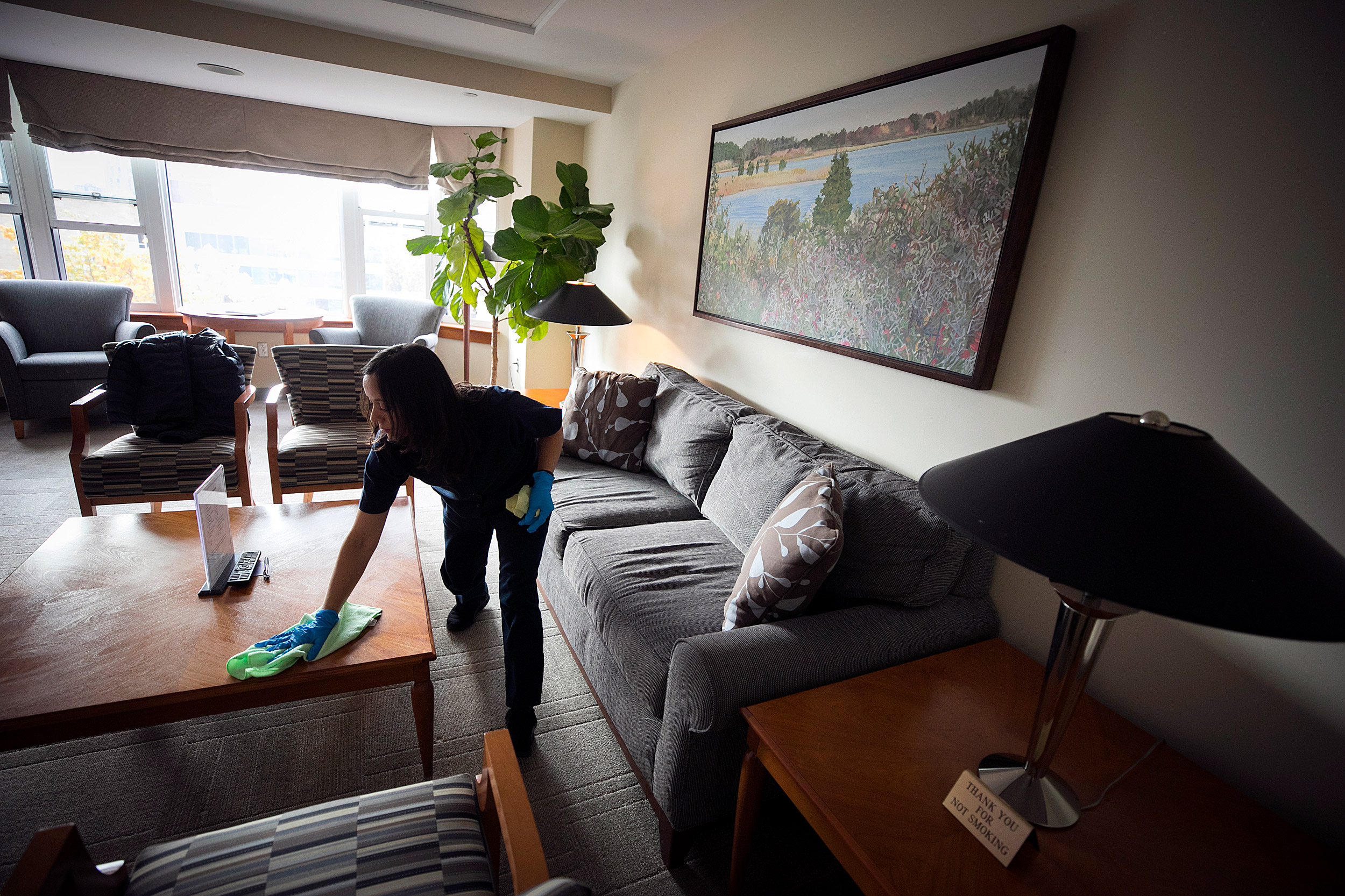
With fast movements, Osorio cleans walls, doors, tables, and whiteboards, as well as the microwave and counter in the kitchen area. She dusts lamps, couches, and chairs, sweeps, and mops the kitchen floor. She pats cushions and sits them straight on the sofas. If the room is extra-messy, she takes pictures to show to her supervisors. She collects used foam cups, yogurt containers, and plastic bottles and puts them in the recycling bin, and takes the trash out and puts it in the cart.
After a sweeping look, she declares the room done. Cleaning a living group can take as few as 10 minutes or as many as 30. She is a subcontractor, like many University custodians, and Harvard oversees their work.
“I don’t mind cleaning up,” says Osorio. “I like everything to be clean and orderly.”
More than two hours after eating a turkey sandwich on her lunch break, Osorio cleans the 20th living group of the day and is ready to put her scrubs away. She says that when she wears the custodian’s uniform, some people assume that she doesn’t speak English or can’t do other types of work. In her former life, she worked in an office. She learned English when she came to the U.S., almost 17 years ago, to join her mother, who had immigrated to the Boston area.
During a stint as an intern at the Department of Anthropology at the Peabody Museum of Archaeology & Ethnology, under the Bridge program, Osorio sampled a different life. She worked on updating the department’s alumni database, using Excel skills she learned in a previous job, and relished dealing with people and expanding her horizons.
“I don’t want to stay in the same job for 30 years,” Osorio says. “I have always wanted to make my life better for me and my daughter.”
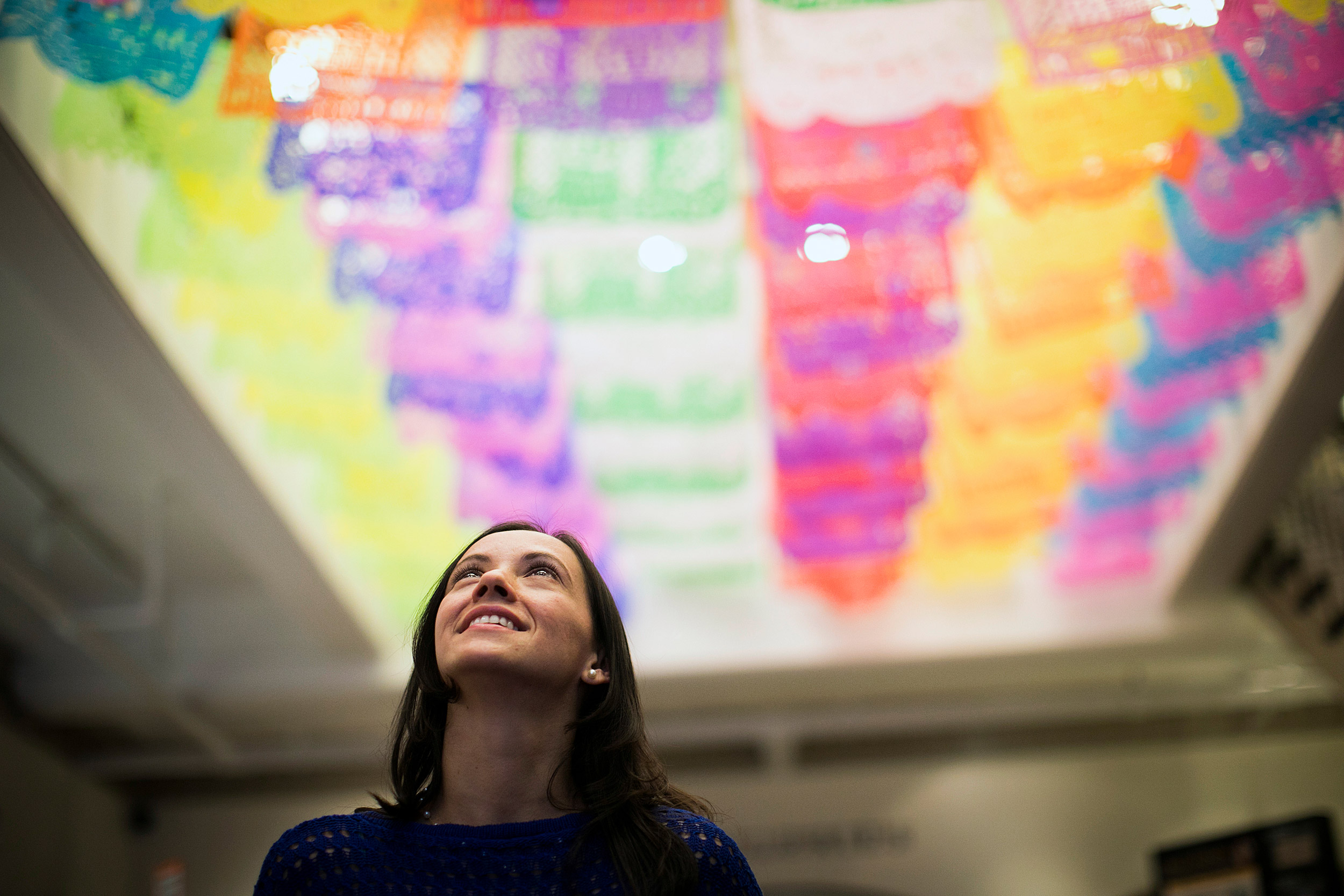
Three times a week, Osorio cleans the Somerville office building after her shift at HBS. She mops the stairs and the floors of the hallways and common areas, cleans the bathrooms, and puts out the trash and the recycling. When she leaves, around 7 p.m., the streets are buzzing with people heading home or going out to eat out at the bars and restaurants in nearby Davis Square.
“The work is physically exhausting,” said Osorio, “but I need the extra money to put it away for the difficult days ahead. There is so much uncertainty surrounding immigration.”
A Honduran citizen, Osorio has a permit to live and work in this country through a Temporary Protected Status (TPS) visa, which was given by the U.S. government to Hondurans who were fleeing humanitarian disasters in their home country in the late 1990s. In May, the Trump administration announced the program will end in 2020, and Osorio is concerned. Nearly 57,000 Hondurans living in the U.S. are here under the TPS program.
“I’m worried more than ever,” Osorio says. “I don’t know what’s going to happen.”
It’s dark by the time Osorio gets home. She skips dinner because it’s late. Sometimes, she makes shrimp with pasta, steak with mashed potatoes, or chicken with vegetables. Most of the time, she prepares chimol, a salsa of tomatoes, cilantro, radishes, and lemon juice. Often, she and her daughter have fruit or a licuado, a milkshake. Stefani loves her mother’s food. She asks, “Why don’t you open a restaurant, Mom?”
Before going to sleep, Osorio says good night to Stefani but keeps her concerns to herself. When she was pregnant, she dreamed of a bright future for her daughter. Despite the uncertainties, Osorio is still hopeful.
“My dream is that my daughter has the most normal life she can have, and my goal is to be there for her for, whatever life holds for her,” Osorio says. “Sometimes I think of becoming a physical therapist to help my daughter, and sometimes I think about going to college. For now, my dream of going to college is a bit distant, but it hasn’t disappeared.”
Tonight, Osorio knows for sure she’ll have a good night’s sleep.
“I’m always tired,” she says. “I sleep well.”




